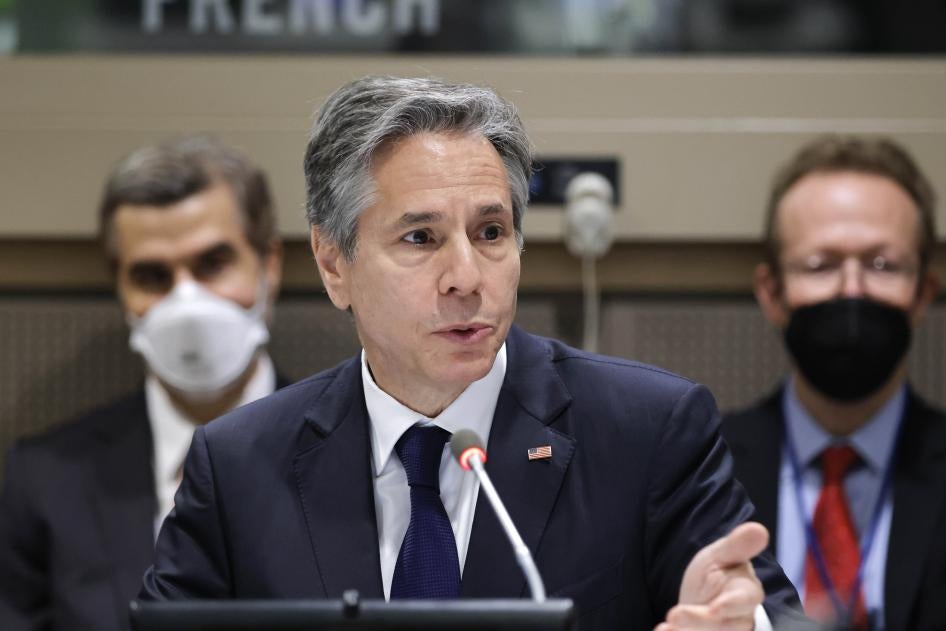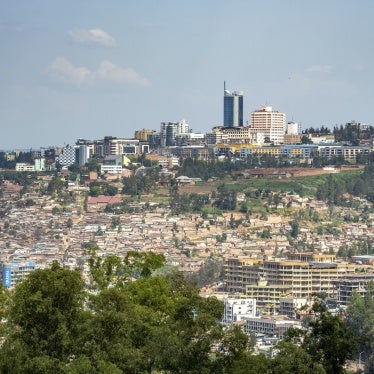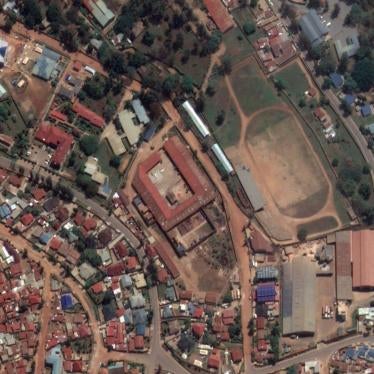(Washington) – The United States Secretary of State Antony Blinken’s planned visit to Rwanda from August 10 to 12, 2022, will come amid heightened concerns that the M23 armed group is, again, receiving Rwandan support for abusive operations in the Democratic Republic of Congo, Human Rights Watch said today. Blinken will also visit Congo where the M23 has expanded its control in the North Kivu province, in the eastern part of the country, targeting civilians with summary killings.
The visit provides an opportunity to condemn these attacks, including war crimes, and any documented support by Rwanda enabling the abusive conduct. The visit should also be used to highlight systematic human rights violations, including crackdowns on opponents and civil society, both within and across Rwanda’s borders. Secretary Blinken should press the authorities to release critics and opponents who have been jailed for exercising basic rights.
“Secretary of State Blinken should speak some hard truths during his trips to Rwanda and Congo,” said Lewis Mudge, Central Africa director at Human Rights Watch. “Failing to address Rwanda’s abysmal human rights record has emboldened its officials to continue to commit abuse, even beyond its borders.”
Rwanda’s ruling party, the Rwandan Patriotic Front (RPF), has waged a brutal campaign against real and perceived critics of the government for years. Recently, high-profile critics, including internet bloggers, have been arrested and threatened. Some have recently said they were tortured in detention. The authorities rarely credibly investigate enforced disappearances or suspicious deaths of opponents. Arbitrary detention and ill-treatment in unofficial detention facilities is common, especially around high-profile visits or large international events such as the recent Commonwealth Heads of Government Meeting.
Blinken is set to raise the case of Paul Rusesabagina, whose arrest and detention in August 2020 falls within well-documented patterns of abuse against critics and raised grave concerns over the politicization of Rwanda’s judiciary. Rusesabagina, now a Belgian citizen, was living in the US when he travelled from the US to Dubai, United Arab Emirates. He was forcibly disappeared until the Rwanda Investigation Bureau announced it had Rusesabagina in custody in Kigali. Human Rights Watch documented several due process and fair trial violations throughout Rusesabagina’s trial, which resulted in a lengthy sentence.
Blinken should also raise the cases of journalists, commentators, and opposition activists jailed for exercising their rights to freedom of association and expression. On May 30, a detained commentator popular on YouTube, Aimable Karasira, told a judge that he was tortured in detention and denied medical treatment. In a July 7 court appearance, he said he had been punished for revealing his treatment in detention and beaten again.
Attacks and threats against Rwandan refugees living abroad, including in Uganda, Mozambique, and Kenya, continue unabated. The victims have tended to be political opponents or critics of the Rwandan government or of President Paul Kagame.
Commentators, journalists, opposition activists, and others speaking out on current affairs and criticizing public policies in Rwanda have been forcibly disappeared, and some have died under suspicious circumstances. The Rwandan government consistently fails to effectively investigate allegations of extrajudicial executions, enforced disappearances, deaths in custody, arbitrary detention, torture, and other ill-treatment, or ensure accountability. In many of these cases, the evidence points to the involvement of state security forces. This has created a climate of fear among the population and widespread impunity.
Among these cases is the suspicious death in police custody of well-known activist and singer Kizito Mihigo, despite calls from international partners including the then assistant US secretary of state for African Affairs, Tibor Nagy. Innocent Bahati, a popular poet who published his work focusing on social and human rights issues on YouTube, disappeared in suspicious circumstances on February 7, 2021, and remains missing. The authorities have made vague and unsubstantiated claims that he has left the country.
Blinken should ask for concrete updates on investigations and any steps taken by the authorities to deliver justice in these cases, Human Rights Watch said. The US should urgently signal that there will be consequences for the government’s repression and abuse in Rwanda and beyond its borders.
The M23 was originally made up of Congolese army soldiers who participated in a mutiny in early 2012. These soldiers had previously been rebels in a Rwandan-backed armed group, the National Congress for the Defense of the People. M23 committed widespread war crimes and took over large parts of North Kivu province throughout 2012, with direct support from Rwandan army troops deployed to eastern Congo.
UN investigators at the time also said that Ugandan army commanders had sent troops and weapons to reinforce some M23 operations and assisted the group with recruiting. In 2013, after the M23 briefly captured Goma, UN-backed Congolese government troops forced the M23 back into Rwanda and Uganda. Congolese authorities issued arrest warrants for UN-sanctioned M23 senior commanders in 2013. Rwanda and Uganda never acted on these extradition requests.
As Congo failed to demobilize the group over the last decade, the M23 began recruiting and rebuilding its ranks in 2021. Since May, the M23 has demonstrated a capacity to overrun UN-backed Congolese forces. UN sources and a senior Congolese official have suggested to Human Rights Watch that the group is receiving sustained external assistance.
On June 14, the United States embassy in Congo said it was “extremely concerned about the recent fighting in eastern [Congo] and the reported presence of Rwandan forces on [Congo]’s territory.” The UN Group of Experts on Congo, mandated by the UN Security Council to monitor the implementation of its sanctions regime, confirmed in its June report the presence of men in Rwandan military uniforms in M23 camps. On August 4, media reported that the UN Group of Experts report found “solid evidence” of Rwandan forces fighting alongside and providing other support to M23. The government of Rwanda has repeatedly denied supporting the M23.
As in 2012, the M23 are committing war crimes against civilians, Human Rights Watch said. Witnesses described summary killings of at least 29 people, including children, in June and July 2022. The US should raise with Rwanda the reliable reports that it is again supporting the M23’s abusive conduct in eastern Congo. Secretary Blinken should publicly condemn the M23 attacks in the strongest terms and warn of consequences to Rwanda for any support to the M23 in carrying out such abuses.
Senator Robert Menendez, chairman of the US Senate Foreign Relations Committee, said on July 20 that he would place a hold on US security assistance to Rwanda in Congress over concerns about its human rights record and its role in the conflict in Congo. In a letter to Blinken, Menendez asked for a comprehensive review of US policy toward Rwanda.
“The M23 thrives on impunity and cycles of violence fuelled by a disregard for basic human rights,” Mudge said. “Secretary Blinken should not gloss over the abuse in both Rwanda and Congo but instead put human rights front and center during his visit.”
Rwanda: Human Rights Should Be Priority on Blinken Trip
US Should Raise Human Rights Concerns, Abuse by M23
Your tax deductible gift can help stop human rights violations and save lives around the world.
Region / Country
Most Viewed
-
June 14, 2018
Leave No Girl Behind in Africa

-
December 7, 2011
"How Come You Allow Little Girls to Get Married?"

-
July 19, 2024
World Court Finds Israel Responsible for Apartheid

-

-





